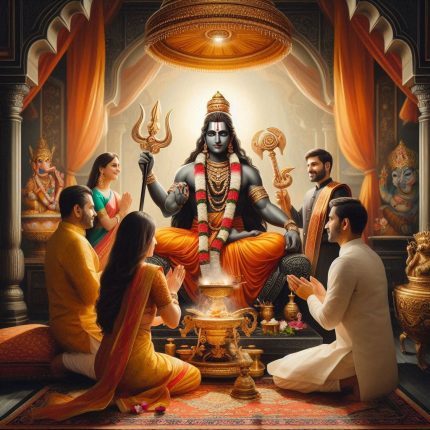Samagri
for Puja:
Haldi [organic] (20gm), Kumkum [organic] (20gm), Tulsi Mala (1), Diya Batti (5), Beetle Nuts (5), Desi Ghee (20ml), Honey (20ml), Jaggery (Gudh) (20gm), Akshata [Yellow rice] (20gm), Yagno-paveetha (5), Karpoora [camphor] (5Tabs), Red/White/Yellow Cloth(1 mtr), Prasad [Laung, Elaichi, Mishri] (20gm), Mouli (25mtr), Ganga Jal (15ml), Durva [fresh] (1), Agarbatti (6)/Dhoop (2), Dakshina (100INR), God Idols (pair), Sambrani (2), Sambrani Holder (1), Kalash [small copper] (1), Panchpatra [small copper] (1), Diya Holder (2), Panchamrit spoon (1), Karpoora Holder(1), includes perishables [Beetle Leaves [fresh] (9), Flowers [fresh] (incl mala), Tulsi [fresh], Mango Leaves [fresh] (7)]
Small Havan:
Cow Dung Cake (2), Mango Wood (250gm), HavanSamagri [20+ Grganic Herbs] (100gm), Ghee (20ml)
Yajman to provide:
Curd (100gm), Milk (100ml), Mithai (250gm), Fruits [5types], Coconut (1), HavanKund, SuchiSarva (Havan Spoon) (1), Kalash [big] (1), Bowl [preferably copper/silver] (1), Spoon [preferably copper/silver] (1), Utensils [2 big Plates (for Aarti/Samagri), disposable Plates, Bowls & Spoons], First solid food (preferably Kheer or Payasam)
Importance and Significance of Mool Shanti Puja
The Mool Shanti Puja is deeply rooted in the belief that the vibrations and energies surrounding us can impact our lives. By performing this ritual, devotees seek to create a positive atmosphere, remove negativity, and enhance spiritual vibrations. It serves as a means to reconnect with the divine, express gratitude, and invite blessings for peace and prosperity.
Benefits of Mool Shanti Puja
- Restoration of Peace: The puja aims to alleviate stress, anxiety, and disharmony, promoting a tranquil environment.
- Spiritual Cleansing: Engaging in this ritual purifies the energy of the individual and their surroundings, fostering positivity.
- Invoking Divine Blessings: Participants seek blessings from deities for health, prosperity, and success in all endeavours.
- Strengthening Relationships: The ritual encourages understanding and cooperation among family members and peers, enhancing personal and professional relationships.
Occasions to Perform Mool Shanti Puja
Mool Shanti Puja can be performed during significant life events, such as moving into a new home, starting a new job, or after experiencing a loss or conflict. It is also conducted during auspicious occasions or festivals to invite peace and prosperity into the household.
Mool Shanti Puja Vidhi (Procedure)
- Preparation: Participants should dress in clean, traditional attire to symbolize respect for the sacred ritual.
- Setup: A sacred space is arranged with an altar featuring idols or images of deities, along with offerings like flowers, fruits, and incense.
- Invocation: The ceremony begins with the invocation of Lord Ganesha to remove obstacles and ensure a smooth puja.
- Offering Prayers: Participants offer prayers, seeking divine intervention for peace and well-being in their lives.
- Puja Rituals: Traditional rituals include chanting specific mantras, performing aarti, and making offerings such as grains, flowers, and sweets to the deities.
- Havan (Fire Ritual): A Havan may be conducted as part of the puja, where offerings are made into the sacred fire, further amplifying the positive energies.
- Blessings: Attendees seek blessings from elders and spiritual guides present, receiving their good wishes for harmony and prosperity.
- Prasad Distribution: The ritual concludes with the distribution of prasad (blessed food), symbolizing shared blessings and gratitude.
Mool Shanti Puja Shubh Muhurat
The Shubh Muhurat for Mool Shanti Puja is ideally chosen based on astrological recommendations to maximize its effectiveness. Consulting with an astrologer can help determine the most auspicious time for the ritual.
By engaging in Mool Shanti Puja, individuals and families invite divine blessings of peace, prosperity, and stability into their lives. This sacred ritual serves as a powerful means of fostering spiritual growth, enhancing well-being, and creating a harmonious environment for personal and communal flourishing.





